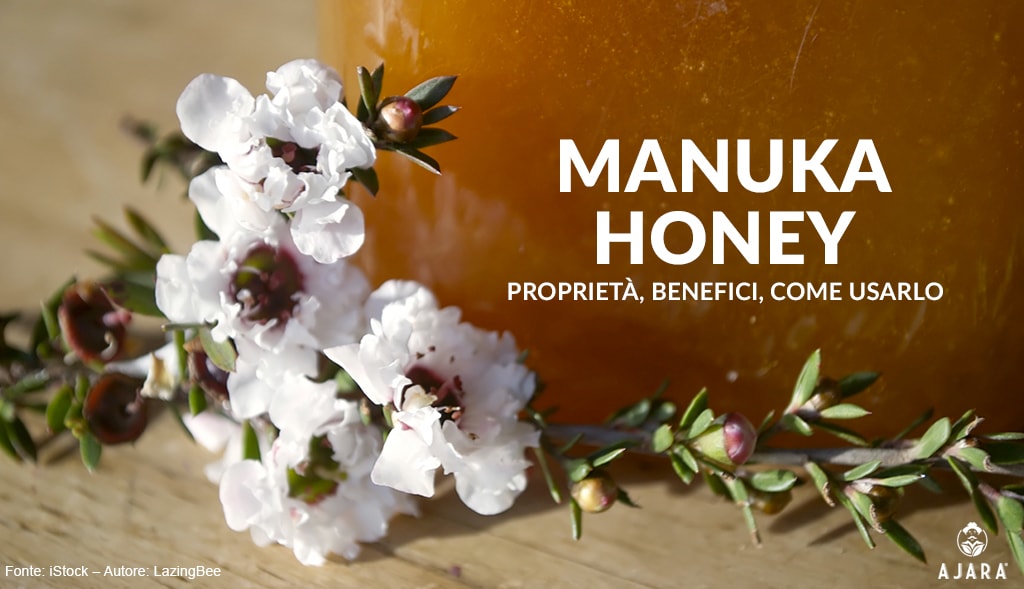Manuka honey therapeutic properties, benefits and how to best use it
Manuka honey properties: discover the properties of Manuka honey and the health benefits. Dosage and daily dose for correct beneficial use.

Among the superfoods of the moment, Manuka Honey is probably one of the most beneficial. Produced by bees, which feed on the Manuka tree, a plant native to New Zealand, the honey of the same name has numerous antibacterial and anti-inflammatory properties and acts on the well-being of those who take it, both if used directly on the skin and if taken via oral. In fact, it is not recommended to use Manuka honey in the kitchen, but it is recommended to use it as a real natural medicine, for healing purposes.
How Manuka honey is born
In order to be called Manuka honey, the product must contain at least 70% of pollen from the Manula tree. Sometimes it can be confused with Kanuka honey, a similar product, but obtained from bees that feed on the pollen of the Kanuka tree, which blooms in the same habitat as the Manuka tree. However, the two honeys have differences in color, flavor and consistency. Kanuka honey is light yellow in color, with a sweet and delicate flavor, while Manuka honey varies from dark cream to brown, is viscous and has a spicy and decisive flavor.
The properties of Manuka honey
The properties of Manuka Honey are numerous and in particular, the antibacterial and healing properties of inflammations and infections stand out. This is due to the action of methylglyoxal, a compound derived from pyruvic acid: in Manuka honey it is 100 times more concentrated than in traditional honey. Honey also contains the glucose oxidase enzyme, secreted by bees, which carries out an antimicrobial action in the body. Its beneficial properties are present both if Manuka honey is taken orally, and with topical use.
Manuka honey: how to use it orally
Taken orally, Manuka honey helps the treatment of gastrointestinal disorders and digestive tract ailments, including poor or slow digestion. Its use is recommended if you suffer from gastric ulcer, gastritis and gives relief in case of reflux and irritable bowel syndrome. Not only digestion: Manuka honey seems to have positive results also on some autoimmune diseases and stimulates the immune defenses, helping the response of our defenses to seasonal ailments, viruses and bacteria. In order to use it in case of digestive problems, you can take two teaspoons of Manuka honey before meals, every day. If, on the other hand, the aim is to stimulate the immune system, it can be taken regularly at the beginning of the day, pure or dissolved in an herbal tea, in a glass of warm water, or together with a fruit juice. However, Manuka honey is not only useful in prevention, but also in the treatment of sore throats, colds and minor respiratory tract problems: in these cases, it is perfect to be taken in small spoons, together with an herbal tea or a pinch of grated ginger.
Manuka honey: how to use it for topical use
Manuka honey has numerous benefits when used directly on the skin. In particular, it seems to be one of the best products to be applied on skin wounds, including surgical ones and helps the treatment of bedsores, ulcers, burns and burns. In fact, Manuka honey seems to stimulate the regeneration of tissues, thus supporting their healing and, thanks to the anti-inflammatory action, relieves wounds and small traumas, reducing pain and swelling and preventing possible infections. Thanks to its consistency, honey spreads deep into the wound, helping it to be cleaned and allowing any gauze not to stick to the skin. Healing is accelerated, avoiding the formation of unsightly scars. Manuka honey is also useful and soothing against acne, furunculosis, psoriasis and dermatitis. To take advantage of the thousand beneficial properties of Manuka honey on the skin, it is good to apply it directly on the area to be treated and let it act for at least 30 minutes. If the wounds are to be bandaged, the honey applied to the wound can be left and bandaged, to be replaced after 24 hours.
Manuka honey can also be associated with other products that can support its anti-inflammatory capacity, such as aloe vera in the case of wounds and acne problems or green tea for gastrointestinal complaints.
Disclaimer
The information provided on Ajara.it is of a general nature and purely for informational purposes and cannot in any case replace the advice of a qualified doctor (ie a graduate in medicine qualified for the profession) or, in specific cases, of other health workers (dentists , nurses, pharmacists, physiotherapists, and so on).
The notions and any information on medical procedures, dosages and / or descriptions of drugs or use products present in the proposed texts and in the published articles have only an illustrative purpose and do not guarantee to acquire the necessary manual skills and experience for their use or practice.
Ti potrebbero interessare anche questi post
-
Venerdì 20 Marzo 2020 -
Venerdì 13 Marzo 2020 -
Wheat grass powder, properties, preparation benefits
Giovedì 5 Marzo 2020 -
Pure Noni juice, properties and benefits
Venerdì 28 Febbraio 2020 -
What is Matcha? Benefits and properties of Japanese green tea powder
Giovedì 20 Febbraio 2020 -
Manuka honey with a thousand properties
Lunedì 17 Febbraio 2020 -
Manuka MGO honey: what the abbreviation mg means and how to use it to obtain benefits
Giovedì 13 Febbraio 2020 -
Organic Matcha Green Tea Protein Pancakes
Mercoledì 12 Febbraio 2020 -
Coconut oil: a panacea for your hair
Mercoledì 9 Ottobre 2019 -
Pancakes with coconut oil
Mercoledì 31 Luglio 2019 -
Matcha tea pancakes
Mercoledì 24 Luglio 2019 -
Natural exfoliating scrub with coconut oil
Mercoledì 19 Giugno 2019 -
Coconut Oil: short pastry (various types)
Martedì 18 Giugno 2019 -
Matcha green tea biscuits
Martedì 11 Giugno 2019 -
Matcha tea pancakes and coconut oil
Martedì 4 Giugno 2019 -
Coconut oil for our four-legged friends
Mercoledì 24 Aprile 2019 -
Coconut Oil in the Kitchen
Lunedì 22 Aprile 2019 -
How to prepare the real Matcha Japanese ceremonial tea
Lunedì 1 Aprile 2019 -
The benefits of coconut oil
Mercoledì 20 Marzo 2019 -
Chocolate tartufini with coconut oil
Martedì 19 Febbraio 2019 -
Muffins with coconut oil
Mercoledì 6 Febbraio 2019 -
Goji water, refreshing summer recipe
Venerdì 1 Febbraio 2019 -
How to use Chia seeds
Mercoledì 1 Agosto 2018
